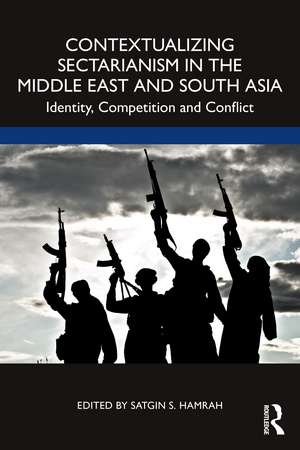Contextualizing Sectarianism in the Middle East and South Asia: Identity, Competition and Conflict
Editat de Satgin Hamrahen Limba Engleză Paperback – 25 iul 2023
| Toate formatele și edițiile | Preț | Express |
|---|---|---|
| Paperback (1) | 302.03 lei 3-5 săpt. | +15.90 lei 6-12 zile |
| Taylor & Francis – 25 iul 2023 | 302.03 lei 3-5 săpt. | +15.90 lei 6-12 zile |
| Hardback (1) | 709.75 lei 6-8 săpt. | |
| Taylor & Francis – 25 iul 2023 | 709.75 lei 6-8 săpt. |
Preț: 302.03 lei
Nou
57.80€ • 61.80$ • 48.19£
Carte disponibilă
Livrare economică 27 martie-10 aprilie
Livrare express 12-18 martie pentru 25.89 lei
Specificații
ISBN-10: 1032359536
Pagini: 192
Dimensiuni: 156 x 234 x 143 mm
Greutate: 0.28 kg
Ediția:1
Editura: Taylor & Francis
Colecția Routledge India
Locul publicării:Oxford, United Kingdom
Public țintă
PostgraduateCuprins
Introduction: Untangling the Complexities of Sectarianism and Moving Beyond Misconceptions 1. Unravelling Sectarianism in South Asia 2. The Ahmadiyya Muslim Community¿s Identity as the ¿True Islam¿ through its Exclusion 3. Understanding the Long-term Impact of Mobilizing Militant Islamists in the Soviet-Afghan War: Strategies of the United States, Saudi Arabia and Iran 4. Advice Columnists in Egypt: Envisioning the Good Life in an Era of Extremism 5. Sectarianism¿s Ambiguity: Lebanon as a Case Study, 1843-1958 6. Falling Together: Identity and the Military in Fragmented Societies 7. Accidentally Accelerating Sectarianism: Elections and the U.S. Role in the Iraqi Civil War 8. Contextualization of Sectarian Conflict and Violence in Iraq: The Intersection of Identity, Power and Conflict 9. Sectarianism and Counterterrorism: Explaining the ¿Silent Space¿ between Policy and Practice 10. Old Stately Friends, New Sectarian Foes: The Modern Saudi-Iranian Roots in Shia-Sunni Sectarianism. Conclusion: The Contextualization of Sectarianism: The Role of Identity, Money and Competition
Notă biografică
Satgin Hamrah is a PhD Candidate in History at Tufts University, where she focuses on the Middle East, South Asia, the Iran-Iraq War, sectarianism, and Islamism, as well as state and non-state conflict and violence. She also focuses on the intersection of identity, memory, trauma and politics on local and transnational levels within the framework of her research interests. Hamrah has a Master of Arts degree in International Relations from Boston University, where her thesis focused on offensive strategies to protect critical infrastructure against terrorism. Hamrah also has a Master of Public Administration degree from the University of Southern California, with a focus on international development and state formation of post-Soviet states in the Caspian region during the 1990s with a focus on Azerbaijan. Hamrah was a Doctoral Fellow at The Fares Center for Eastern Mediterranean Studies at the Fletcher School of Law & Diplomacy at Tufts University between September 2016 and October 2018. She is the founder of the Iran-Iraq War Project.
Descriere
States across the Muslim world are faced with challenges associated with a perpetual cycle of conflict and violence organized along sectarian lines. To understand modern-day sectarianism, it is essential to move beyond explanations that focus predominantly on ancient Sunni-Shia animosities or a singular lens.
It is important to engage in interdisciplinary and multidirectional examinations to better understand how sectarianism is strategically utilized by political entrepreneurs. Moreover, while religious identities and how individuals define themselves and their communities are important, it is also integral to analyze how identity has been utilized in historical and contemporary political contexts on state and non-state levels.
This volume seeks to fill gaps in understanding the complexities associated with sectarianism through a transnational interdisciplinary analytical framework to enhance understanding of the socio-political, religio-political, cultural and security landscapes of the Middle East and South Asia. It also challenges narratives regarding sectarian divisions between Sunnis and Shias and deconstructs popular misconceptions about sectarianism, its spatial and temporal impact, as well as its influence on identities, conflict, and competition.
The volume will be of interest to scholars and researchers of the Middle East and South Asia, and those interested in history, politics, international relations, international security, religion, and sociology.
